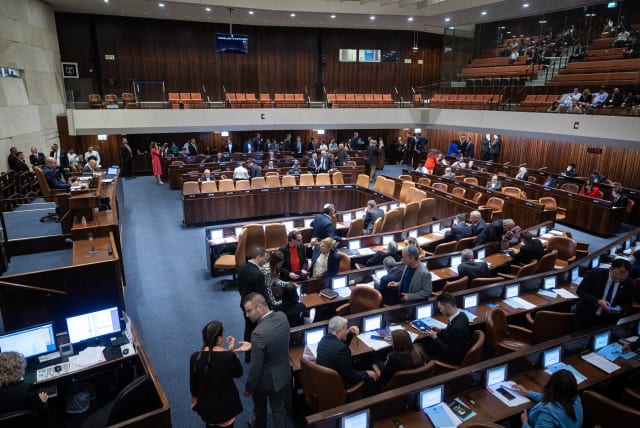Israel needs a constitution, but we cannot rely on Knesset to provide one - opinion

Most citizens lack accountable and responsive representatives. Tens of thousands of citizens take to the streets weekly, yet the effect to date is only temporary.
The events of the past several months, which have laid bare the weaknesses and fissures of our current system of government, have convinced many of the vital need for a constitution for Israel. However, we cannot look to the Knesset to provide us with one.
It is a truism that governments are loathe to enact legislation that reduces their power. Yet we desperately need such legislation in order to rebuild internal and external trust in our governmental and judicial systems and our economy.
For one thing, we need greater separation between the executive and legislative branches so that the legislature can serve as a true check and balance on the executive government. Under our current system, any coalition government can operate without effective challenge from the legislature and can enact almost any law it wishes to. What government would willingly enact legislation making it tougher on itself to get done things?
Nor would any government limit its own ability to act by guaranteeing greater rights for the citizens. But one reason for our Supreme Court’s judicial activism is that our anemic and vague existing “bill of rights” necessitates the court to provide its own interpretations. We need a more extensive and enunciated list of citizen rights.
Additionally, our electoral system institutionalizes and exacerbates the tribal divisions in our society. We are witnessing the explosion of resultant hatreds. Furthermore, most citizens lack accountable and responsive representatives. Tens of thousands of citizens take to the streets weekly, yet the effect to date is only temporary. We lack district representation that exists in all Western democracies. Yet why would a political party agree to enact legislation that changes the rules by which it was elected?
These are but a few examples. We need fundamental change in multiple other areas as well, such as religion vs. state and central vs local government. Adding a few extra basic laws may solve some of today’s problems, but these patches would not address a large number of failures and lacunae in our system. We need an integrated, coherent whole. We need a constitution.
Yet, for the reasons above, there is no way to look to the Knesset for salvation, regardless of what coalition is in power. The 75 years of Knesset inadequacy have yielded the chaos that we are now experiencing. Indeed, through its failure to produce a constitution in three-quarters of a century – despite the explicit directive in Israel’s Declaration of Independence – the Knesset has abdicated its right to do so.
Rather, we, the citizens of Israel, must take the authority back into our own hands. We are the sovereign, after all, not the Knesset. We have the right, authority and power to demand a constitution and define the system under which we wish to be governed.
Thinking outside the box
Since we cannot rely on the Knesset, we must think out of the box. We must petition Citizen Number One – President Isaac Herzog – to task a committee of experts and known leaders representing a broad cross-section of our society to draft a constitution and include the citizens in the deliberative process. This document would be presented to the government and Knesset (this or, perhaps, the next one) for only their up-or-down vote on whether to pass it on to the people for a plebiscite. The people need to approve it by a significant majority… and that document would become our constitution.
The ultimate authority of this presidential committee would derive from the quality of its work product itself. If the committee produces a document that a large majority of the people can point to and say, yes, that is what we want, that will be the source of its authority.
This happened elsewhere before. The Constitutional Convention in Philadelphia was not given a mandate to write a new constitution. Its mandate was limited to enhancing the Articles of Confederation of the 13 independent states. Nonetheless, it exceeded its instruction and, in less than four months, produced a Constitution calling for a totally new and never-before-seen system of government. This “unauthorized” document ended up being ratified on its own merits by all 13 states, despite deep societal divisions, and has served the United States for the last 200 years with little change.
The need for a constitution is not a matter of Right or Left, Jew or Arab, religious or secular. We all deserve knowable rules of the game. We all deserve good governance. We all deserve a constitution. And no one is going to give it to us but ourselves. And if not now – when we can leverage tremendous popular understanding and momentum – then when? Really, when?
The writer was an active member of the Magidor Presidential Commission in the 2000s and is author of Accountability to the People: Instituting Single-Member Electoral Districts in Israel. He is working to build a coalition of organizations promoting a constitutional process.
Jerusalem Post Store
`; document.getElementById("linkPremium").innerHTML = cont; var divWithLink = document.getElementById("premium-link"); if (divWithLink !== null && divWithLink !== 'undefined') { divWithLink.style.border = "solid 1px #cb0f3e"; divWithLink.style.textAlign = "center"; divWithLink.style.marginBottom = "15px"; divWithLink.style.marginTop = "15px"; divWithLink.style.width = "100%"; divWithLink.style.backgroundColor = "#122952"; divWithLink.style.color = "#ffffff"; divWithLink.style.lineHeight = "1.5"; } } (function (v, i) { });

